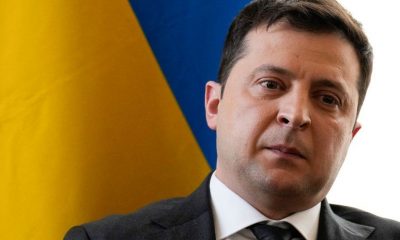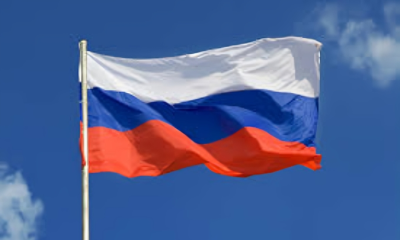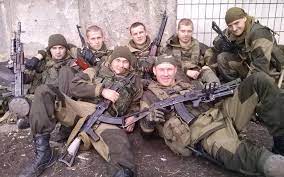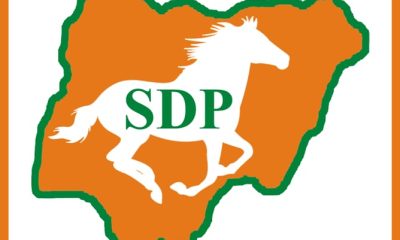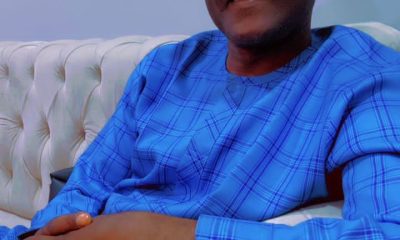Foreign News
Zelenskiy calls on West to warn Russia not to blow up Dam

Ukrainian President Volodymyr Zelenskiy called on the West to warn Russia not to blow up a huge dam that would flood a swath of southern Ukraine, as his forces prepare to push Moscow’s troops from Kherson in one of the war’s most important battles.
In a television address, Zelenskiy said Russian forces had planted explosives inside the huge Nova Kakhovka dam, which holds back an enormous reservoir that dominates much of southern Ukraine, and were planning to blow it up to cover their retreat.
“Now everyone in the world must act powerfully and quickly to prevent a new Russian terrorist attack. Destroying the dam would mean a large-scale disaster,” he said.
Russia accused Kyiv earlier this week of planning to rocket the dam.
Sergei Surovikin, the commander of Russian forces in Ukraine, said Ukrainian forces had already used U.S.-supplied HIMARS missiles against it in what Ukrainian officials called a sign Moscow could be planning to blow it up and blame Kyiv.
Neither side produced evidence to back up their allegations.
The vast Dnipro bisects Ukraine and is several km wide in places.
Bursting the dam could send a wall of water flooding settlements below it, including much of the city of Kherson, which Ukrainian forces hope to recapture in a major advance.
Damage to the dam would also wreck the system of canals that irrigates southern Ukraine, including Crimea, which Moscow seized in 2014.
Zelenskiy called on world leaders to make clear that blowing up the dam would be treated “exactly the same as the use of weapons of mass destruction”, with similar consequences to those threatened if Russia uses nuclear or chemical weapons.
One of the most important battles of the eight-month-old war is coming to a head near the dam as Ukrainian forces advance along the river’s west bank, aiming to recapture Kherson city and encircle thousands of Russian troops.
Ukraine has imposed an information blackout from the Kherson front, but Russian commander Surovikin said this week that the situation in Kherson was “already difficult” and Russia was “not ruling out difficult decisions” there.
The Kremlin on Friday sidestepped a question about whether or not President Vladimir Putin had given an order for Russian forces to withdraw from Kherson, referring the question to the defence ministry.
Ukraine’s armed forces general staff said up to 2,000 newly-mobilised Russians had arrived in the region “to replenish losses and strengthen units on the contact line”.
Russian-installed occupation officials have begun what they say is the evacuation of tens of thousands of civilians across the river from towns on the west bank.
They accused Kyiv of shelling a ferry, killing at least four civilians. Ukraine acknowledged an attack but said it came after a civilian curfew.
On the Ukrainian-held side, the town of Bashtanka, located about 40 km (25 miles) from the Kherson front, was alive with Ukrainian troops, many buying winter gear from outdoor stalls and a store hawking military clothing and equipment.
The town bore the scars of Russian shelling that left some buildings in the center gutted or damaged.
As Russian forces have faced setbacks on the battlefield since September, Putin has escalated the war.
Last month he ordered the call-up of hundreds of thousands of reservists, announced the annexation of Russian-occupied territory, and repeatedly threatened to use nuclear weapons to protect Russia.
This month, he began a campaign of attacks using cruise missiles and Iranian drones to knock out Ukraine’s power supply ahead of winter.
Kyiv and the West say that amounts to deliberate targeting of civil infrastructure and a war crime.
Since Thursday, Ukrainians have experienced countrywide calls to reduce electricity consumption and some blackouts, which the authorities say are necessary to fix power stations damaged in the attacks.
The United States said on Thursday that Iranian troops were in Crimea and had helped fly the drones to attack Ukraine.
“We can confirm that Russian military personnel based in Crimea have been piloting Iranian UAVs and using them to conduct kinetic strikes across Ukraine, including in strikes against Kyiv in recent days,” U.S. State Department spokesman Ned Price told a briefing.
Iran has denied supplying the drones, as has Moscow, although many have been shot down and recovered making their provenance clear.
“Iran and Russia, they can lie to the world, but they certainly can’t hide the facts, and the fact is this: Tehran is now directly engaged on the ground,” White House national security spokesman John Kirby said.
Ukrainian Foreign Minister Dmytro Kuleba said on Twitter he had held detailed discussions with Israeli Prime Minister Yair Lapid on a request for air and missile defence systems and technology.
Lapid’s office said the Israeli leader expressed “deep concern” about the military connection between Iran and Russia. (NAN)
Foreign News
Australian Researchers Launch Open-source, Affordable DNA Measurement Device

Australian researchers have created an affordable, open-source device to measure DNA levels using parts made with a standard 3D printer.
The Do-It-Yourself Nucleic Acid Fluorometer (DIYNAFLUOR) offers an affordable alternative to expensive commercial DNA fluorometers, often out of reach for many researchers.
This is according to a statement released on Wednesday by Australia’s University of Queensland (UQ), which led the research.
Fluorometers, vital for DNA sequencing, which itself is essential for disease detection, therapeutic innovation, and species identification, can now be easily built at home.
Thanks to the simple, accessible device developed by UQ’s Australian Institute for Bioengineering and Nanotechnology (AIBN), the statement said.
The device can be built in under a day for around 60 Australian dollars (about 39 dollars) using off-the-shelf electronics and 3D-printed parts.
It’s with free instructions online and no need for advanced skills or specialised tools, said the designer of the device, Will Anderson, at the AIBN.
Once built, the device quantifies DNA by using a light beam to produce a fluorescent response from the dyed DNA present in the sample.
It would then report the DNA concentration to a connected computer, Anderson said.
“This is crucial information that can tell you whether you can proceed with more expensive tests and sequencing,” he added.
Laboratory tests confirmed the device matches the accuracy and sensitivity of costly commercial models, offering an affordable, open-source solution for researchers in resource-limited, remote, or educational settings, said the study.
Foreign News
Trump Imposes 25% Tariff on Indian Goods, Criticizes Ties with Russia

U.S. President Donald Trump said he is imposing a 25 per cent tariff on goods from India starting on Friday.
Writing on his Truth Social platform, Trump sharply criticises New Delhi for its military and energy ties with Russia.
He described India as a “friend” but accused the country of maintaining unfair trade practices that disadvantage U.
S. businesses.India has “strenuous and obnoxious” trade barriers that keep its markets closed to companies, he wrote, adding that its tariffs are “far too high.
”Trump also took aim at India’s relationship with Russia, saying: “They have always bought a vast majority of their military equipment from Russia, and are Russia’s largest buyer of ENERGY, along with China.
In addition to the new tariff, Trump said India would face a financial “penalty” for its purchases from Russia, though he did not provide further details.
Foreign News
Zelensky Announces New Draft Law on Anti-corruption Bodies after Protests

Ukrainian President Volodymyr Zelensky said he has approved the text of a draft law guaranteeing the freedom of two anti-corruption bodies in Ukraine – days after nationwide protests broke out over changes curbing their independence.
Kyiv’s Western partners had also expressed serious concerns over the legislation.
On Thursday, Zelensky seemed to backtrack, saying the new bill was intended to safeguard the independence of Ukraine’s National Anti-Corruption Bureau (Nabu) and Specialised Anti-Corruption Prosecutor’s Office (Sap), and to protect them from Russian influence.
He said the text of the bill was “balanced”, but did not provide any details.
The law passed earlier this week brought Nabu and Sap under the control of the prosecutor general, who is appointed by the president.
At the time Zelensky justified his decision to curtail the bodies’ powers by citing Russian influence. The day before, Ukraine’s security services had carried out searches and arrests targeting alleged Russian spies at the agency.
The passing of the legislation instantly sparked the largest protests since the start of Russia’s full-scale invasion in February 2022 in several cities across Ukraine, with many worrying the law would severely undermine the Nabu and Sap’s authority and effectiveness.
Thousands of people gathered in streets and squares across Ukraine, holding placards calling for the legislation to be vetoed.
Several commentators accused Zelensky of democratic backsliding. Their concerns were further exacerbated when Ukraine’s Western partners signalled their displeasure with the bill.
Ukraine has official EU candidate status and a spokesman for European Commission chief Ursula von der Leyen previously warned Kyiv that the rule of law and the fight against corruption were “core elements” of membership to the bloc.
On Thursday, the Commission said it “welcomed” the Ukrainian government’s decision to take action against the bill.
“We are working [with the Ukrainian government] to make sure that our concerns… are indeed taken into account,” the spokesman said.
Nabu and Sap were created in 2014-15 as one of the requirements set by the European Commission and International Monetary Fund to move towards a relaxation of visa restrictions between Ukraine and the EU.
Writing on Facebook, opposition MP Oleksiy Goncharenko noted Zelensky said that “the independence of anti-corruption institutions must be guaranteed.”
“First we take it away, and then we say that it must be guaranteed. So why was all this necessary?”
In his message on social media on Thursday, Zelensky did not acknowledge the protests or the backlash but said it was “important that we respect the position of all Ukrainians and are grateful to everyone who stands with Ukraine.”

